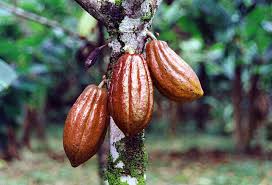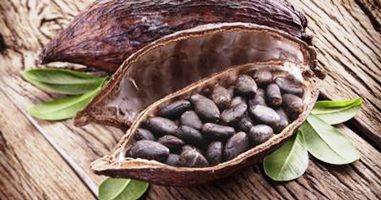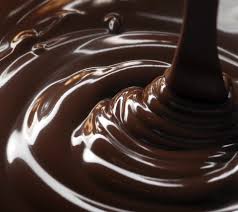
Instead of talking about Saint Valentine, today I'm going to talk about "Saint Chocolate", with whom Saint Valentine is joined at the hip. According to a plethora of recent medical articles, you may eat your Valentine's Day chocolates without guilt. Chocolate is good for your health. Yay! Well, within certain limits, that is. You know the lecture about "all things in moderation."
OUR FRIEND THE CACAO BEAN
The cacao is an evergreen tree native to humid and wet (tropical) regions of Central and South America. Its white flowers become cacao pods. When ripe the fruit is orangish and weighs about a pound. The flesh is eaten or made into juice, and the beans, or seeds, inside are the source of cacao powder which is made into chocolate. The fat from the seeds in made into cacao butter.
The use of cacao has been around for a very long time. The indigenous peoples of Mesoamerica recognized the medical benefits of cacao before the time of Christ (1900-900 BC), and used it to treat stomach and intestinal problems. To those societies it was very valuable.
Cacao is also part of the Mayan Creation belief. Deemed of holy origin, the Mayans believed the Plumed Serpent gifted cacao to humans after they were created by the goddess Xmucane. Named Theobroma -- "The Food of the Gods" – it was restricted to the elite of society.
Fast forward two thousand years, give or take a few.
When the Spaniards came to the western hemisphere, cacao made its way to Europe. Christopher Columbus was the first to bring it, but it didn't catch on. Cacao by itself is very bitter. Later it became popular as a medicine and aphrodisiac.
Cocao and Cocoa are often used interchangeably but, in fact, cocao refers to the tree, pods, and beans – the natural products. Cocoa means the products manufactured from the beans. Just sayin'.

Cacao beans are rich in chemicals with antioxidant, anti-inflammatory, and anti-clotting properties. The heroes in cacao, flavanoids and flavanols, widen blood vessels, reduce blood pressure and loosen platelets, preventing them from forming clumps which reduce blood flow. They also may increase production of nitric oxide, which helps improve insulin sensitivity. In addition, Flavanols protect brain cells and improve cardio vascular function, so more blood reaches the brain. The theobromine in falvanols is a stimulant which inhibit the vargus nerve which is responsible, in part, for the cough reflex.
The most cultivated species, Theobroma cacao, contains protein, fat, carbohydrates, fiber, iron, zinc, copper, calcium, magnesium, sulfer, and the chemicals phenylethylamine and anandamide.
The most beneficial chocolate – dark chocolate -- contains at least 85% cocao and cocoa butter, not added palm, coconut, hydrogenated, or partially hydrogenated oils. Cocoa butter's saturated fats contain stearic acid, so cocoa butter doesn't raise cholesterol levels because it's converted in the liver to heart-healthy oleic acid. (Eric Ding, PhD, an epidemiologist and faculty scientist in the department of nutrition at Harvard School of Public Health).
Refined sugar, used to sweeten the bitter taste of chocolate, is bad for the same health benefits Cacao is good for. Choose the darkest chocolate. UC San Francisco research say to limit intake to 7 ounces per week of dark or semi-sweet chocolate. That's about two bars.
The nine health benefits of chocolate (by Diane Wedner, Lifescript Health Directive and reviewed by Edward C. Geehr, Chief Medical Officer, Lifescript) are as follows:
1. Lowers the risk of heart attacks.
2. Protects against blood inflammation.
3. Reduces risk of diabetes
4. Helps control weight by limiting the number of calories the body can turn into fat.
5. Improves memory and task performance, and slows cognitive decline, particularly in seniors.
6. Improves math skills.
7. Controls coughs.
8. Improves mood by stimulating production of natural opioid chemicals such as endorphins.
9. Reduces stress by lowering levels of stress-related hormones cortisol and catecholamine.
Like you really wanted to know that!

All very well and good. As you are munching happily, don't forget about the refined sugar added to make chocolate sweet. If you eat too much, you've cancelled out all the benefits of the cacao with the deadly affects of the sugar.
That's a real Valentine's Day Buzz Kill!
RESOURCES
http://www.macfieldmd.com/uncategorized/chocolate-and-the-brain/
https://www.psychologytoday.com/blog/the-resilient-brain/201410/dark-chocolate-good-your-brain
http://www.lifescript.com/health/centers/heart_health/articles/the_health_benefits_of_chocolate.aspx
http://www.medicalnewstoday.com/articles/270272.php
http://www.medicinehunter.com/brief-history-cocoa
http://www.cnbc.com/2016/03/24/future-of-the-chocolate-industry-looks-sticky.html
http://www.medicalnewstoday.com/articles/295615.php?utm_source=TrendMD&utm_medium=cpc&utm_campaign=Medical_News_Today_TrendMD_0
http://www.medicalnewstoday.com/articles/235756.php?sr=&utm_source=TrendMD&utm_medium=cpc&utm_campaign=Medical_News_Today_TrendMD_0
http://www.naturalnews.com/041178_cacao_history_chocolate.html




 RSS Feed
RSS Feed